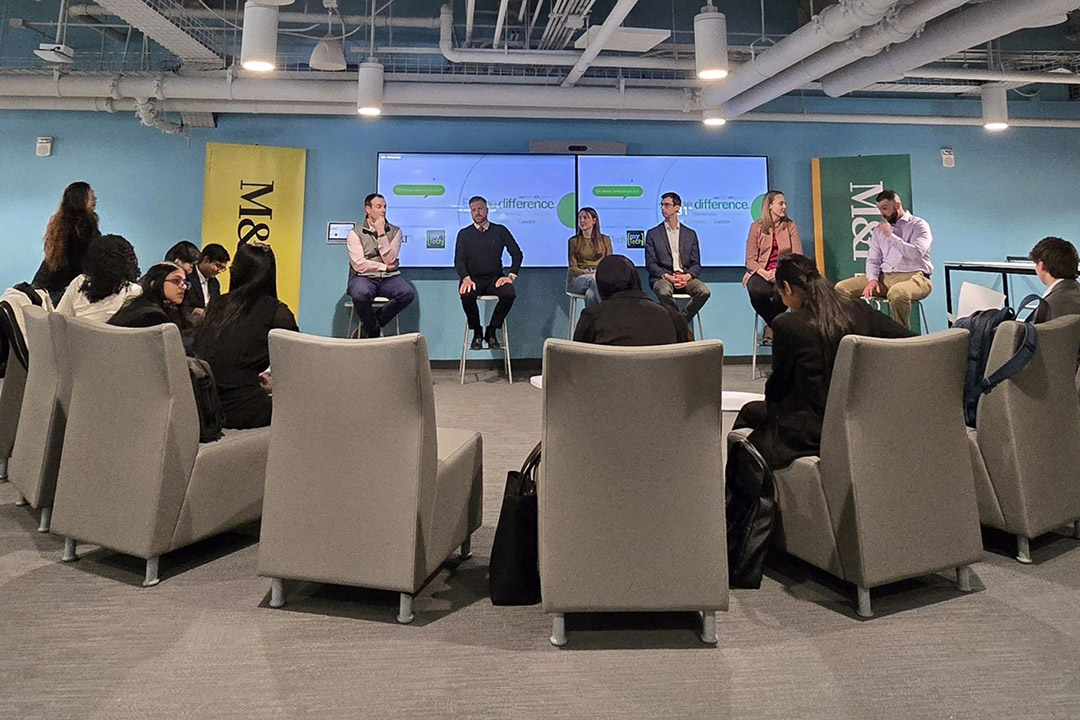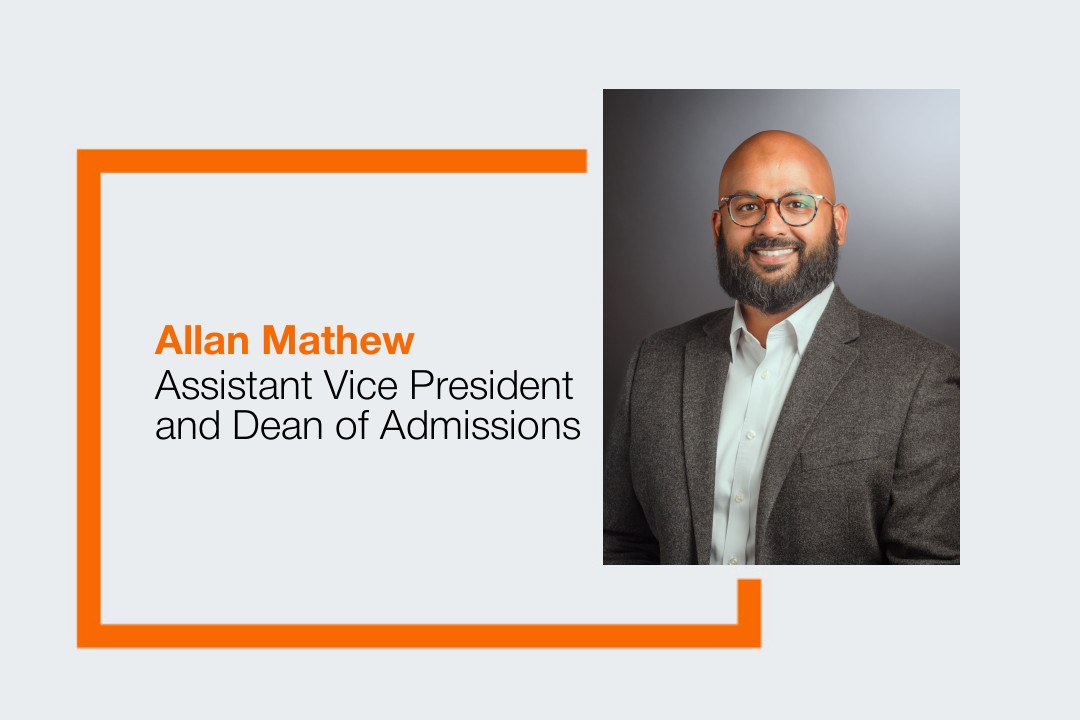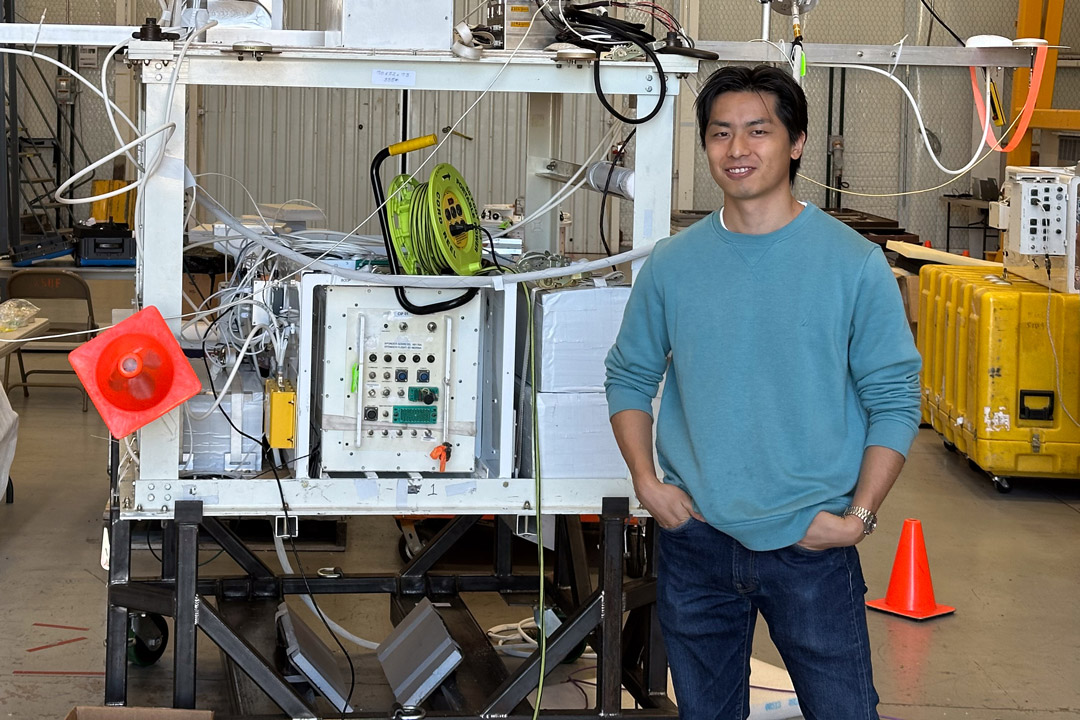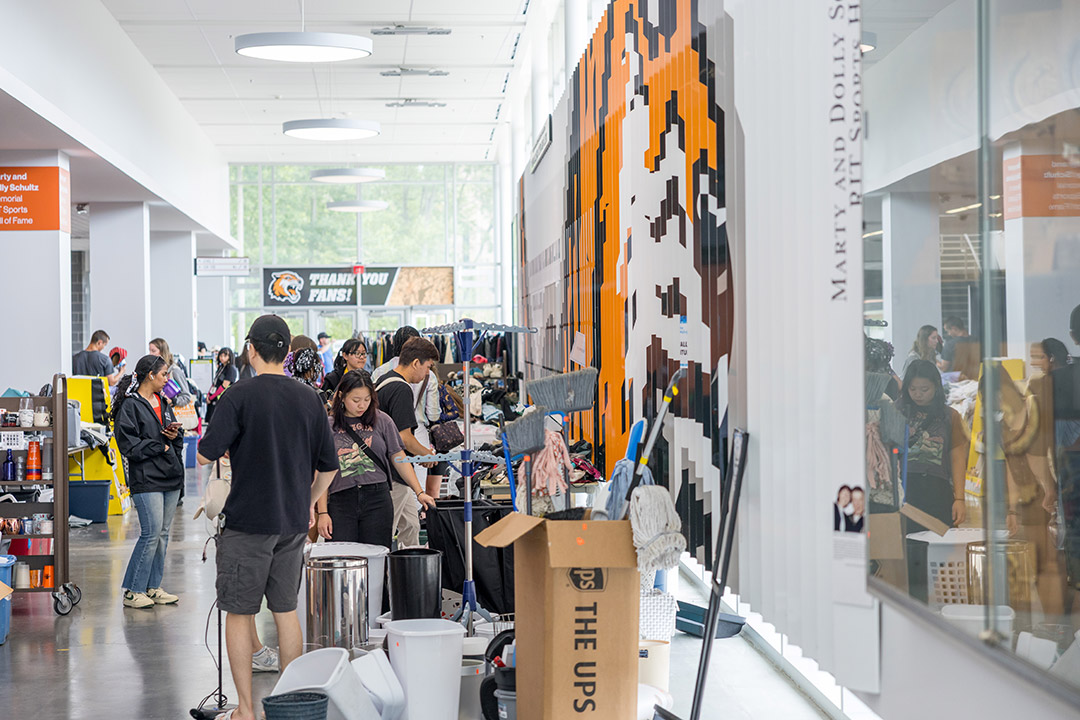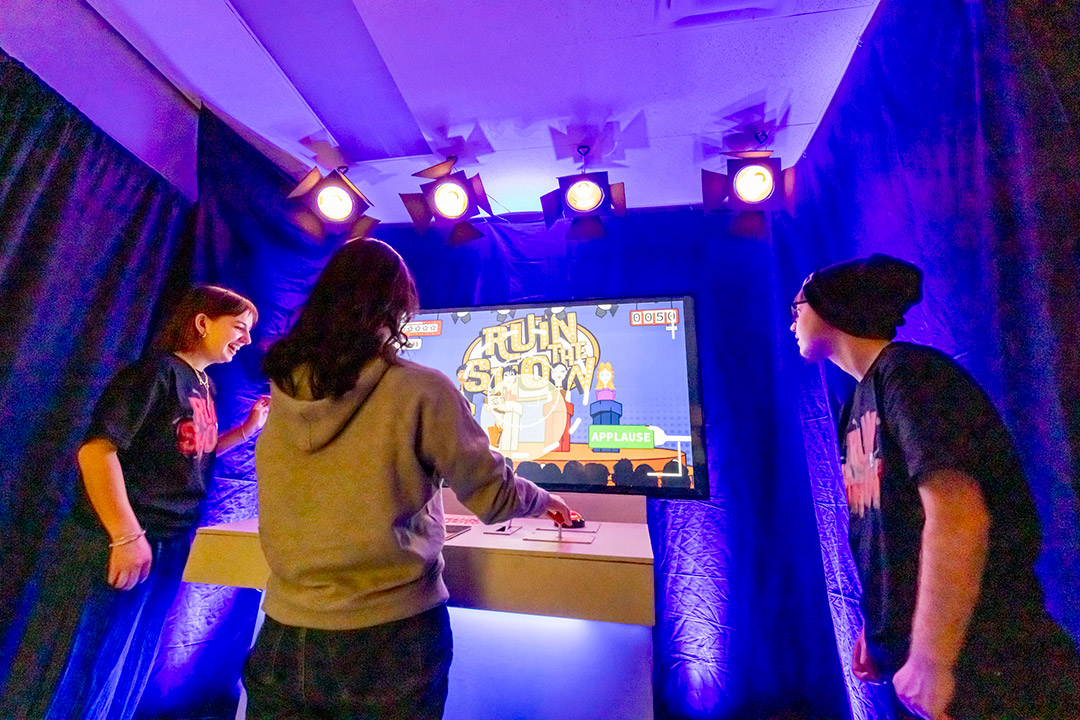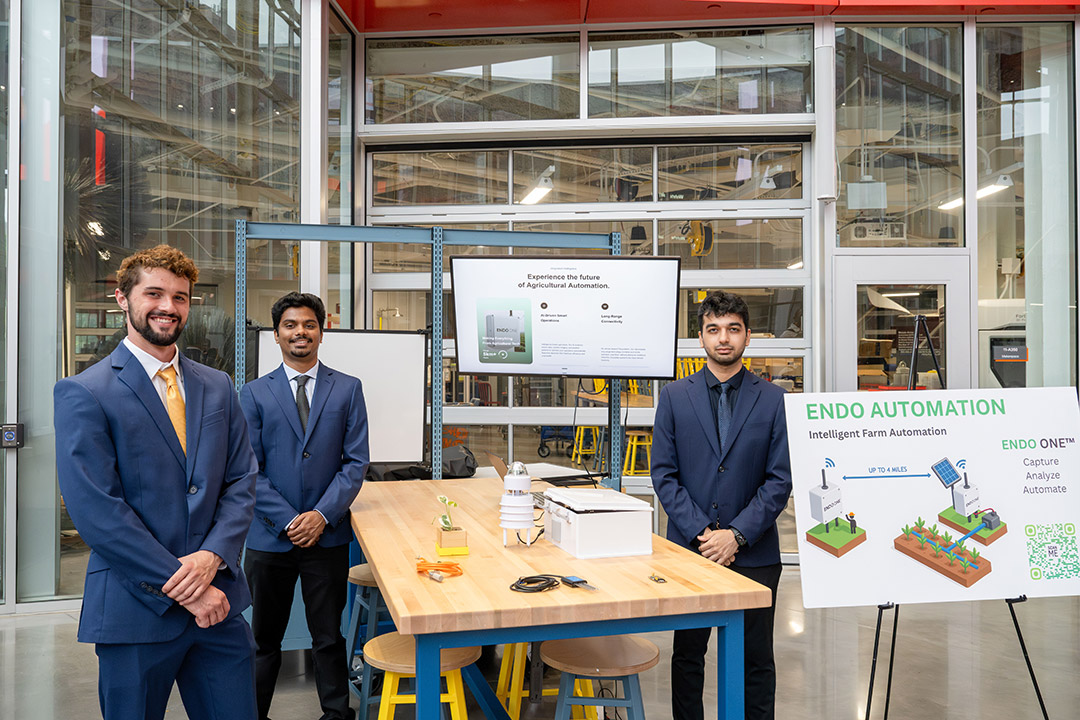Traveling Tigers connects Saunders students with career opportunities
A program at Saunders College of Business is helping students gain real-world immersion into the careers they study. The Traveling Tigers program bridges gaps for students between classroom learning and career launching. Saunders students have been visiting a wide array of local and regional organizations to learn about varied business careers across disciplines.
In 2024, building upon this program, Archana Jain, department chair for finance and accounting, began organizing Traveling Tigers visits focused specifically on those interested in opportunities in finance and accounting, as part of a broader push to increase industry exposure.
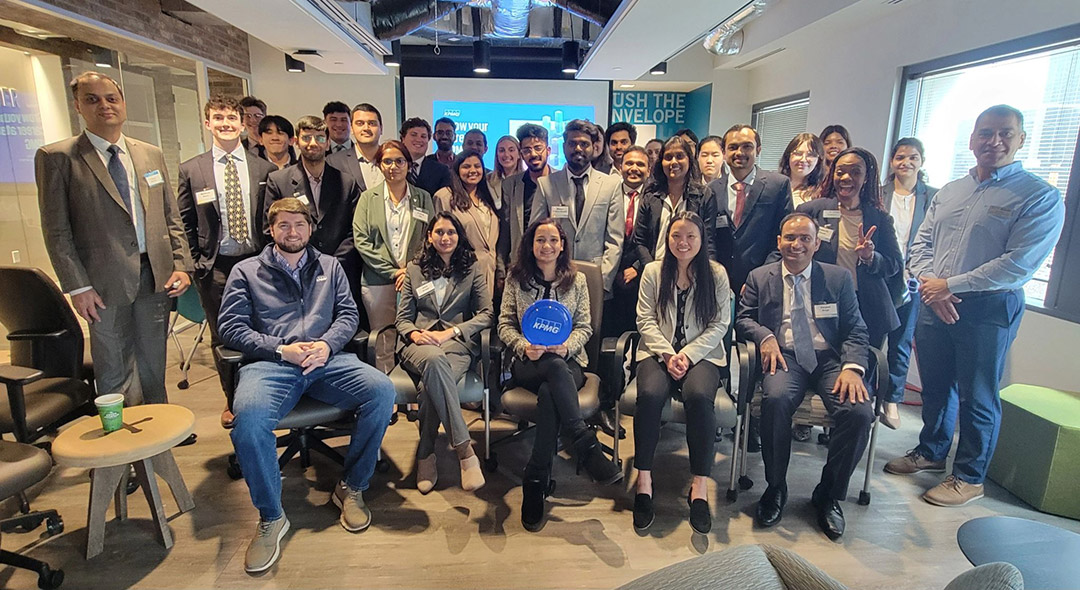
Provided
Archana Jain, front and center, poses with a group of students and staff on a visit to KPMG during a Traveling Tigers event in 2024.
Each semester, Jain works through Saunders’ advisory boards and corporate partners to arrange a three-to-four-company tour over the course of a day. Students spend about two hours at each site, meeting different staff and human resources leaders, hearing presentations on corporate culture and skill needs, and touring facilities.
“They can get a basic view of the culture of these companies, what it really means to work in, say, an accounting or finance firm,” said Jain. “They get to compare and see the differences in culture and expectations. They also learn about the pathways available to interns or new hires, like rotation programs. In just one day, they get a clear sense of what it means to work in the field.”
The response from industry has been strong. After one of the first visits, Jain shared a post on LinkedIn that drew positive feedback from two companies, both eager to host future tours.
“The accounting world is facing a shortage of talent, so these visits give employers a chance to meet students and showcase their culture,” said Jain. “The companies go all out and roll out the red carpet for us. On one visit they even made special cookies to welcome the Tigers. It’s a good way for both sides to connect.”
Over the last year, students have visited regional firms including Culov Wealth Management, M&T Bank, Delaware North, MMB+CO, Allied Financial Services, Freed Maxick, and PwC. The results have been positive, as some students have received internship or job opportunities afterwards. In one recent visit, a company hired five Saunders students as interns.
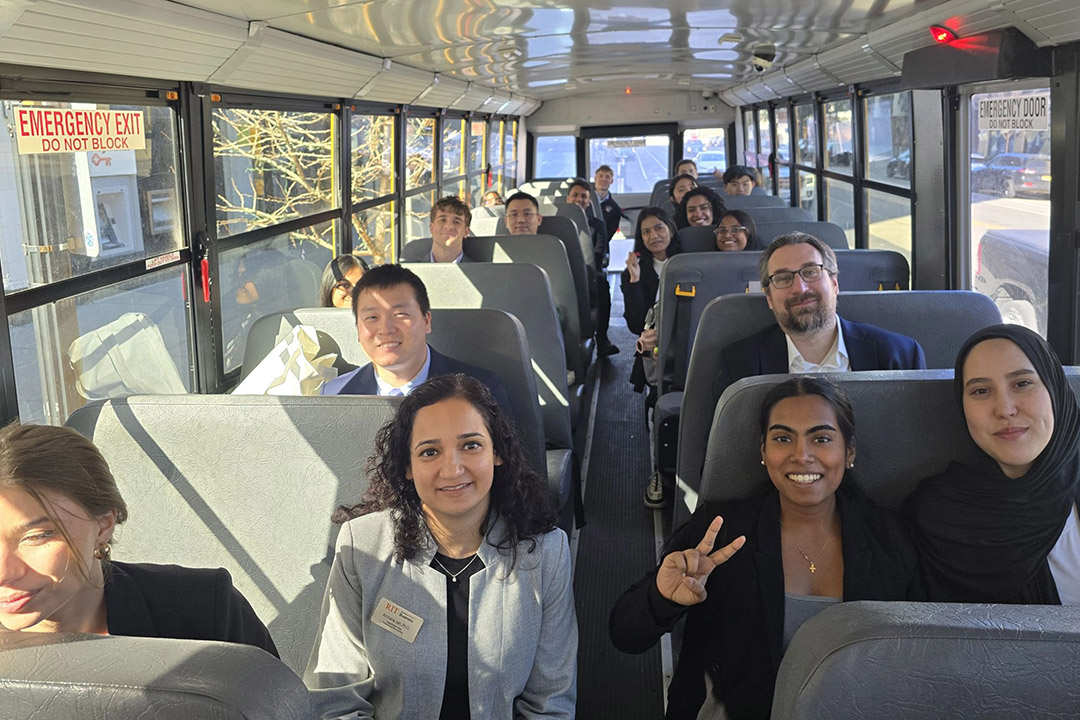
Provided
Transportation and visits to accounting and financial firms are made possible in part by donations through the Sentinel Society.
Spencer Dennis, a third-year accounting and finance major and honors student from Webster, N.Y., had a similar result.
“In my first year here, I fully intended on being a finance major, hopefully to be an investment banker or financial analyst for a bank,” Dennis said. “Upon visiting firms with Traveling Tigers, I realized I am made to be a CPA and to pursue a career that starts in public accounting.”
Dennis set his sights on joining a Big Four firm in Rochester. During a visit to PwC, he received a hat as a souvenir and promised himself he wouldn’t wear it until he earned an internship there. That visit gave him a foot in the door at PwC’s Rochester branch, turning him into a familiar face at RIT recruiting events. Last fall, he interviewed with a managing partner he had first met on that visit, and soon after received a lucrative offer.
Dennis indicated, that they typically bring on interns to hire them full time. “I have a spot saved for an associate position in January, which is super exciting,” he said. “Traveling Tigers helped make that possible; it allowed for a student like me who puts in 100% of effort into things to capitalize on that opportunity.”
The program is made possible through the generosity of donors, including support from the Sentinel Society, whose gifts help fund the travel and logistics needed for these site visits. At Saunders, Sentinel Society support has also enabled students to attend national conferences and competitions, expanding their professional exposure beyond the classroom.
“Programs like Traveling Tigers, along with opportunities to attend conferences and competitions, ensure that our students gain meaningful experiences outside of the classroom that can shape their careers and futures,” said Jacqueline Mozrall, dean of Saunders College of Business. “Fueled by alumni donations, Traveling Tigers has been expanded, with discipline-focused visits also happening in hospitality, supply chain, marketing, management information systems and analytics. We are deeply grateful to our donors for investing in our students and making these transformative opportunities possible.”
The next Accounting Traveling Tigers event is scheduled for Oct. 21 and will include visits to Insero, Paychex, EY, and DeJoy & Co. Space is limited to 20-30 matriculated students at Saunders.
Latest All News
- Allan Mathew named RIT assistant vice president and dean of admissionsFollowing a national search, Rochester Institute of Technology has named Allan Mathew as its assistant vice president and dean of admissions. Mathew, a seasoned leader in undergraduate, graduate, and international admissions, joined the university’s Division of Enrollment Management on Aug. 1. At RIT, Mathew oversees undergraduate and graduate admissions and is responsible for leading efforts to recruit talented, distinctive, and globally minded student cohorts. His focus is on aligning recruitment strategies with RIT’s brand and mission, cultivating strong student connections, leveraging data and technology for decision-informed strategies, and fostering a team rooted in student engagement. “Allan stood out in our search for his strategic insight, technical fluency, and proven record in advancing enrollment goals,” said Kathleen B. Davis, vice president for Enrollment Management and associate provost. “He also brings a clear passion for student access, equity, and innovation—values that are central to our work at RIT.” Mathew brings more than a decade of admissions and enrollment leadership experience across a range of institutional settings. Most recently, he served as senior director of Graduate Admissions at Tufts University, where he led admissions for over 75 graduate programs. Prior to Tufts, Mathew was assistant dean for Graduate Student Enhancement at the University of Texas at Dallas. He also served in key leadership positions at Messiah University in Pennsylvania, contributing to both graduate and undergraduate enrollment strategy, student success initiatives, and admissions marketing. His experience includes recruitment, systems optimization, and building pathways for students from diverse backgrounds to thrive in higher education. “My goal is to lead a team focused on recruiting students who seek the kind of education that RIT so uniquely offers,” said Mathew. “It’s exciting to join a division, and a community, focused on the future of strategic enrollment management; from global partnerships, expanding our brand nationally, and redefining student pathways to higher education success I am confident my experience and leadership will be well suited to RIT’s mission and strategic priorities.”
- Newest RIT Tigers encouraged to aim high and be themselvesRIT’s newest Tigers were formally welcomed Thursday with cheers, advice, and challenges to dream big. After posing for a group photo spelling RIT, the students paraded among cheering faculty, staff, and the RIT Pep Band during the annual Tiger Walk on the way to the Gordon Field House and Activities Center for the Fall Convocation for New Students. Scott Hamilton/RIT Incoming students posed for a group photo spelling RIT before Fall Convocation for New Students. “The faculty and staff at RIT are here to support you through the journey that lies ahead,” said Prabu David, RIT’s provost and senior vice president for Academic Affairs. “We are here to help you learn and grow.” Kathleen Davis, vice president for Enrollment Management, said the new class comes from 48 states, Washington, D.C., Puerto Rico, and 40 countries. Nearly 750 undergraduates will be earning both a bachelor’s and graduate degree through the Combined Accelerated Bachelor’s/Master’s Degrees program. This class also has 579 Performing Arts Scholars, the largest incoming cohort in the program’s history, as well as several graduate-level Fulbright Scholars and other international scholarship winners joining the university this year. Carlos Ortiz/RIT RIT President Bill Sanders starts a new tradition of taking selfies during Fall Convocation for New Students. Student Government President Rafael Gilboa, a software engineering student, encouraged the new class to get involved, seek help, meet people, touch grass, and make mistakes. “No matter what aspects of your life you want to improve, what areas you may feel you’re lacking, or miss from high school, new things you want to learn or things you want to try with like-minded people, there is space for that here—you just have to look for it. And even though it’s never too late while you’re still enrolled at RIT, the best time to start is now,” he said. Lea Michel, a professor in the School of Chemistry and Materials Science, was keynote speaker. She told the students that their college experience will likely come with some missteps, struggles, and bumps in the road. “These setbacks might shake your confidence, maybe even have you questioning your potential. You are here because you belong here,” she said. “As you begin your journey here at RIT, remember this: falling is not failing. It is a vital part of your growth as a scholar.” It was the first RIT convocation for Bill Sanders, who became RIT’s 11th president on July 1. Traci Westcott/RIT Thousands of incoming RIT students are cheered by faculty and staff during the annual Tiger Walk on their way to the Fall Convocation for New Students. “I have a great deal in common with you today,” he told the students. “Like you, I am learning how to navigate this campus; I am trying to understand the lingo and culture; and I am charting my way as I begin my tenure as your president. What I have discovered so far is that RIT is a university like no other. I’m deeply honored to join this extraordinary community, and I already feel the energy that makes RIT so unique. I am confident in saying this: Both you and I have made the right choice.” He urged students to “unlock the creativity and innovation that lives in each of you,” taking advantage of the faculty and staff who will support them. “We are here to help you make the most of all your experiences here.” Sanders also encouraged students to get involved in clubs that interest them, while acknowledging the views and interests of others. “The world can be a messy place,” he said. “But that’s even more reason to step up and make it better. Learn how to discuss difficult topics honestly and respectfully. Learn how to disagree, with grace and civility. Learn how to become involved in your communities to effect positive change. These and other opportunities outside the classroom may be as important as your academic studies.” Sandra Johnson, senior vice president for Student Affairs, said RIT values its students’ individuality, quirks, backgrounds, and dreams, calling their uniqueness their superpower. “You make this community stronger just by showing up as yourself,” she said. Johnson told students to be daring, be active, persevere, and dream big. She had them write a dream of theirs on a provided piece of paper, which they folded into an airplane and tossed in the air as the convocation concluded. “It’s great to see your goals take flight today at RIT,” David said. “As you start your first semester with us, enjoy the flight. In a few years, at your graduation, you will reminisce on this moment.”
- Student-led NASA project takes flight on balloon missionA years-long student-led NASA project that develops technology to help guide rockets will near its final destination this month on board the Balloon Optimization Opportunity Platform!, or BOOP! Provided The BOOP! mission logo Astrophysical sciences and technology Ph.D. student Kazuma Noda has taken the lead and traveled to New Mexico for the launch of the balloon mission, which will take the Cryogenic Star Tracking Attitude Regulation System (CSTARS) into the atmosphere. Past RIT undergraduate students used NASA funding to create CSTARS, an instrument designed and built to orient a rocket payload based on the images of stars. CSTARS previously flew on the sounding rocket named the Cosmic Infrared Background ExpeRiment-2 (CIBER-2), but firmware issues hampered the mission. BOOP! will provide advantages to see CSTARS get the results many RIT students have worked towards. “I think we fixed the issue we had, and now we want to see if this can track stars again,” said Noda, who added that balloons are much cheaper than sounding rockets, and observation time will increase from 8 to 10 minutes to possibly four hours with BOOP! Associate Professor Michael Zemcov from the School of Physics and Astronomy and Professor Dorin Patru from Kate Gleason College of Engineering have been the lead advisers on the CSTARS effort, and are excited to see BOOP! take it to the finish line. “All these algorithms and systems and electronics that we’ve built over the almost ten years in support of CSTARS, we’re finally at the point where it all works,” he said. “This is a fun project that has a long history that many students have contributed to over the years.” As an undergraduate student in Japan, Noda worked with sounding rockets in collaboration with CIBER. He knew he wanted to continue doing the work, so he made the move to RIT for graduate school. While Zemcov corresponded with NASA to get CSTARS involved with the BOOP! mission, he handed the project to Noda to lead. “For a Ph.D. student, the ideal situation is to be given a leadership role,” said Zemcov. “He’s done really well in executing that. We should be giving students these opportunities as much as we possibly can. It’s the best way to learn.” Noda previously traveled to NASA’s Wallops Flight Facility in Virginia to integrate CSTARS onto the BOOP! gondola, and traveled to New Mexico for BOOP!’s launch, giving him hands-on, real-world experience with a NASA mission. As Zemcov added, “There’s no substitute for going out and doing it yourself.”
- Goodbye, Goodbuy! builds a decade of sustainability habitsA pink-and-green upholstered couch with wood accents made its third appearance at this year’s Goodbye, Goodbuy! sale. It’s not that it has been unwanted and waiting for a home. On the contrary. It’s been donated, sold, redonated, and resold three times. The couch is a testament to the sustainability efforts of the student-led Goodbye, Goodbuy! program, which for 10 years now has accepted donations from students moving out of residence halls and apartments at RIT each spring. Items are sorted and stored until new students move in for the fall semester, when they are sold at thrift store prices. Any unsold items are donated to Goodwill. “I definitely think we’ve made an impact with students,” said this year’s program director, Spencer Griebel, a fifth-year cybersecurity and computer information technologies double major from Webster, N.Y. “Even after the main collection in the spring had ended, I got emails from students wanting to donate things. Students are thinking about the program. It not only makes it easier for them to move out, it benefits the environment.” Traci Westcott/RIT From left, first-year students Autumn Clarke, Jordan Igel, and Kelly Yang check out Goodbye, Goodbuy! on Aug. 19 at the Gene Polisseni Center. This year, Griebel said more than 22,000 pounds of donations were collected, and that doesn’t include two tractor-trailers filled with furniture. This circular process offers a multitude of benefits: saving items from entering landfills; reducing carbon emissions; helping reduce costs to haul away trash for RIT; and helping students get items at low costs. The money generated from the sale is used to offset some of the costs to run the program. This spring, 14 student captains worked during collection, in addition to 200 volunteers. This year’s sale had 11 student captains and more than 100 volunteers. Volunteers also included RIT employees and staff from other area colleges who wanted to see how the program is run so that they may start their own. Volunteers are invited to a presale or can use a $5 certificate to use during the sale. Almost everything can be collected. Items this year included a ukulele, a gold-plated chain and pendant, designer clothing that still had its tags on, interesting sculptures and other art projects, an industrial coffee machine, and electronics including laptops, headphones, and televisions, which are tested to make sure they work. Electronics that don’t work are disposed of at proper e-waste sites. RIT departments have embraced the mission of the program as well. Tables being replaced from the Gene Polisseni Center were donated this year. Furniture, hangers, and racks were donated when Barnes & Nobles closed, kitchenware was donated from Henry’s restaurant, RIT Housing donates furniture they are replacing and other departments that are cleaning or moving regularly contribute as well. “We really appreciate everyone’s mindfulness and dedication. RIT is proud of what Goodbye, Goodbuy! has become, and it is our amazing students and many campus partners who make it a success every year,” said Enid Cardinal, senior advisor to the president for strategic planning and sustainability. “It’s one of our most visible sustainable initiatives.” Alden Smith, a 2024 finance graduate who had an immersion in environmental studies, worked for the program in her freshman year and served as its director a year later. “I got involved because I was very passionate about environmental sustainability and was trying to find an intersection between business and sustainability, finding ways businesses can be more environmentally conscious,” she said. “It was a fantastic experience. There were so many students who were absolutely shocked to find out how much they were able to save from landfills. That prompted students to think about the impact they have when they are buying things. It’s a really great learning opportunity.” Nick Giordano ’16 (management information systems) was the program’s first director in 2015. He returned to campus this year to volunteer several days with the collection and sale. He still uses the dresser he purchased from the sale that first year and is pleased to see so many more students involved as volunteers and in paid leadership roles. “I think it was impressive that the program has persisted for 10 years and matured so much,” he said. “It’s become an annual tradition and certainly brings sustainability to the forefront of campus.” As a college student on a budget, Griebel says he recycles and aspires to buy things second-hand when possible. But it’s more than just to save money. “Participating in Goodbye, Goodbuy! is a very easy way to start implementing sustainability in your everyday life,” he said. “It shows you ways to decrease your footprint and think about sustainability and ways to reduce waste while saving money. I’m pretty proud the program is still running and done so well after 10 years.”
- RIT cited as a top university for career outcomes by The Princeton ReviewRochester Institute of Technology once again made The Princeton Review “Best Colleges” list, recognized for its career outcomes for its students and superior game design programs in the Best 391 Colleges 2026 edition. Although specific rankings are not assigned in many categories, RIT does rank No. 6 for its undergraduate game design and development programs. Among other categories RIT was highly ranked: “Best Northeast” (a separate ranking by region and for colleges considered academically outstanding); “Colleges that Create Futures” (colleges that empower students to discover practical applications for their talents and interests through experiences that complement classes and coursework); and “Green Colleges” (colleges that emphasize sustainability in practice). This year’s profile details information about RIT’s co-op program—one of the country’s oldest and largest programs that regularly turns out career-ready students. The university culture was praised by students: “This is where students are able to create what their minds generate. It’s like a teenager’s dream” and “RIT has a culture for everybody.” Since 1992, the guide highlights the best in undergraduate academics. It features only about 15 percent of all U.S. four-year colleges and universities and uses survey information and comments from students to assess rankings with a focus on categories important to prospective students and families. The range of comments and high marks were in categories from campus life and academic programs to admissions and financial aid. The Princeton Review is one of several national and international rankings received by RIT.
- Student incubator provides space for aspiring entrepreneursZevez Zalay, a third-year finance and marketing student, has long been fascinated with the idea of community. After spending a day searching for a local spoken-word poetry group in Rochester, Zalay worked to envision a platform that offers a different experience. Zalay and their business partner, third-year software engineering student Nathan Jackson, are the creators of GroupSoup, a social engagement platform that brings people together for recurring meetups hosted at local businesses. The goal is to foster organic, authentic community building while helping small businesses increase foot traffic and gain customer insights. Pete Schuck/RIT From left, Nathan Jackson and Zevez Zalay present GroupSoup, a marketplace platform that helps drive foot traffic to local businesses, during Demo Night of the Bernard Kozel StartUP Program @ Saunders. “There’s no convenient catalog for people looking to organize meetups unless you’re willing to cold message businesses on Facebook or send out emails, which is a tedious process,” Zalay said. “We want to connect people who want to build community with businesses that want to bring people through the door.” The Bernard Kozel StartUP Program @ Saunders is helping student teams like GroupSoup turn innovative ideas into the beginnings of tangible businesses. As the program concludes its first cohort as a newly established program under the Saunders College of Business, named in honor of Bernard Kozel – well respected for his roles as a businessman and entrepreneur, innovator, investor, and connector. Eight student-led companies are reaping the rewards of a unique support system designed to help them thrive. Pathways for student entrepreneurship are not new to RIT. This program was originally founded in 2011 by professor Richard DeMartino and the late Rich Notargiacomo, former director of RIT’s Venture Creations business incubator, and later run by director Anthony Testa and Evan Vershay under the RIT Student Accelerator name until its rebranding in early 2025. In all, 167 teams and 479 students have participated across the last 23 cohorts. The effort is made possible by many benefactors, including support from the Bernard Kozel Endowed Fund for Innovation and Entrepreneurship. The program, open to all RIT students, is a 12-week immersive summer experience, offering guidance, hands-on learning, and networking opportunities for the student teams. The teams invest into their projects full-time and are given an honorarium to help build their ideas and meet at least twice a week as a group. They have alternative sessions with coaches, who have decades of business experience, and guest speakers from the world of business and leadership. The program culminates with Demo Night, where the teams showcase their business ideas in front of friends, family, and potential investors. One such venture is Endo Automation, which was supported through the Sarah Ramsey Strong Fund, and founded by graduate software engineering students Devaj Mody and Shridhar Vilas Shinde, and Lex Baker, a second-year computer science major. Their solution to a critical modern farming issue: a low-cost, AI-enabled drip irrigation system that uses soil moisture and rainfall sensors to optimize water usage. “We noticed the issues with farmers across the board, especially those in more arid regions in India and the United States,” said Mody. “Water shortages, loss of crops, and the expense to run a farm are all barriers for them. We basically decided to design a system that's able to carry out irrigation at a fraction of the cost, with all the benefits that the farmer would have.” The Endo Automation team designed and perfected their system in Rochester over the summer. The product is already gaining traction. The team has planned deployments this month at four farms in India, including a large vineyard. They’re also eyeing applications to World Bank initiatives for agricultural innovation. Provided The 23rd cohort of the Bernard Kozel StartUP Program @ Saunders was led by program director Anthony Testa, front, second from right, along with support by, from front left, coaches Steve Brookstein and Richard Condon, the 2025 Bernard Kozel Mentor of the Year. Along with GroupSoup and Endo Automation, this summer’s teams included: CYPER, an affordable cybersecurity assessment platform for small-to-medium businesses; ModuCore, a company which creates personalized organizers geared toward lifestyle artisans; Bone Bros, a semi-custom shoe brand bridging the gap between modern footwear and foot health; CollegeGO, an affordable one-stop shop for students and parents to simplify the college application experience; OpenSeek, an education and employment platform for early career UX designers; and Obscura, a breakthrough technology which prevents AI theft of art. A major addition to this summer’s format was the introduction of co-op students, provided with support from Saunders College, who were embedded into the startup teams. “That was a great experience,” said Baker. “It was a different look into managing others who may not have a stake or equity in the company like the three of us. We had to learn how to manage those different expectations, which was great to learn.” “The co-ops added a new dynamic,” added Testa. “Integrating any group of people into a process is not without hard work. The Kozel teams are learning entrepreneurship, but they're also learning how to be leaders and managers on the fly, which is really cool in this safe space.” Throughout the 12 weeks, the teams also formed a tight-knit community. They supported each other regularly through impromptu design feedback and help troubleshooting customer discovery hurdles. One example is through the OpenSeek team, who helped teams like Endo Automation with UI/UX work. A shared Discord group allowed the students to stay connected and share resources in real-time. “This was definitely one of the more connected groups we have had,” added Vershay. It's always encouraged by Anthony and me, but at the end of the day it's on them to really make it happen and connect with each other. They were great about that this year.” The 2025 cohort marked a turning point for the program. It drew a record number of applicants—24 in total—allowing staff to accept the most committed and promising eight groups. “We had alumni and long-time supporters telling us this was the strongest cohort they’d ever seen,” Testa said. “These students came ready.” Applications for the 24th cohort in the summer of 2026 are open on a rolling basis. Interested student teams are encouraged to apply early and reach out for guidance.



